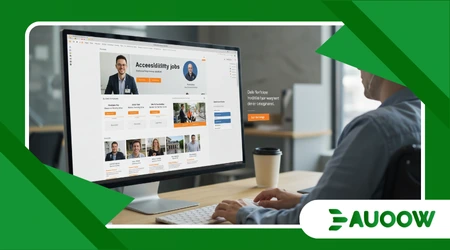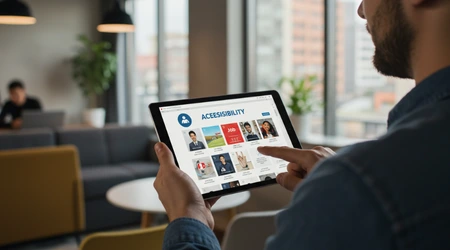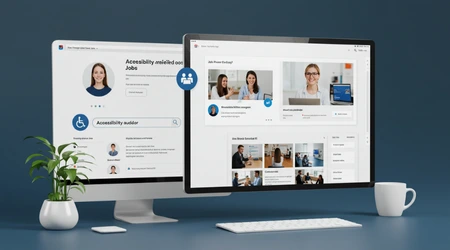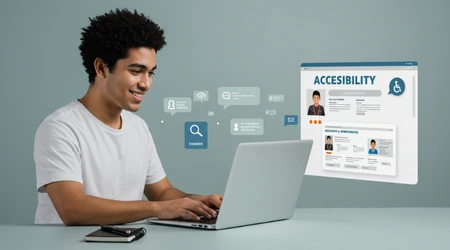The Best Online Job Platforms with Accessibility in Mind

In 2025, online job platforms with accessibility in mind are transforming how job seekers and entrepreneurs connect with opportunities, prioritizing inclusivity.
These platforms bridge gaps, ensuring that people with disabilities can navigate job searches effortlessly. Why does accessibility matter?
It’s about equity creating a digital workspace where everyone can thrive.
This article explores the best online job platforms with accessibility in mind, highlighting their features, benefits, and why they’re essential for an inclusive job market.
From screen reader compatibility to intuitive designs, we’ll dive into platforms that empower all users, backed by real-world examples and data.
The job market is evolving, with remote work and digital entrepreneurship booming. Yet, for millions with disabilities—over 1 billion globally, per the World Health Organization barriers persist.
Accessible platforms remove these hurdles, offering tools like keyboard navigation and alt text. This isn’t just about compliance; it’s about unlocking potential.
Whether you’re a job seeker or an entrepreneur hiring talent, choosing online job platforms with accessibility in mind ensures broader reach and better user experiences, aligning with modern values of diversity and inclusion.
Why Accessibility Matters in Online Job Platforms
Accessibility in online job platforms with accessibility in mind isn’t a luxury it’s a necessity. It ensures equal access for users with visual, motor, or cognitive impairments.
Platforms prioritizing accessibility comply with WCAG 2.2 guidelines, enhancing usability for all. This fosters trust and widens talent pools.
Consider Sarah, a visually impaired job seeker. She uses a screen reader to apply for remote roles.
++ The importance of representation in leadership positions
A platform with clear alt text and keyboard navigation empowers her to succeed independently. Without these, she’s excluded, limiting her opportunities.
Moreover, accessibility boosts SEO. Search engines favor user-friendly sites, improving platform visibility.
A 2023 study by Accessibilitychecker.org found 73% of accessible websites saw increased organic traffic. This benefits both users and platform owners.
Accessible platforms also align with legal mandates. The EU’s Accessibility Act of 2019 requires digital inclusivity, reducing legal risks for businesses. This makes accessibility a win-win for ethics and strategy.

Top Online Job Platforms with Accessibility in Mind
Several platforms stand out for their commitment to accessibility, offering robust features for diverse users.
Let’s explore the best online job platforms with accessibility in mind, their strengths, and how they serve job seekers and entrepreneurs.
1. LinkedIn: A Leader in Inclusive Design
LinkedIn integrates accessibility into its core, supporting screen readers and high-contrast modes. Its clean layout aids users with cognitive disabilities, ensuring intuitive navigation. Job seekers can filter remote roles easily.
For entrepreneurs, LinkedIn’s hiring tools are keyboard-accessible, streamlining talent searches. The platform’s alt text for images enhances usability for visually impaired users, making job postings inclusive.
Regular updates ensure WCAG compliance, keeping LinkedIn a top choice. Its mobile app also supports voice commands, catering to motor-impaired users seeking flexible work.
Also read: Affirmative job vacancies: how they work and where to find them
LinkedIn’s focus on inclusivity attracts diverse talent, helping entrepreneurs build innovative teams. Job seekers benefit from a platform that values their accessibility needs.
2. Indeed: Simplified Access for All
Indeed excels with its minimalist design, reducing cognitive overload for users with disabilities.
Its job search tools support screen readers and keyboard navigation, ensuring seamless access. Online job platforms with accessibility in mind like Indeed prioritize user experience.
Entrepreneurs benefit from Indeed’s accessible job posting interface, which simplifies hiring. The platform’s mobile optimization ensures job seekers can apply on the go without barriers.
Indeed’s commitment to WCAG 2.2 includes descriptive link text, helping screen reader users navigate job listings efficiently, boosting engagement for all.
Read more: Platforms supporting the employment of people with disabilities
Its global reach makes it ideal for entrepreneurs targeting diverse markets. Job seekers find a user-friendly interface that supports their career goals.
3. FlexJobs: Remote Work with Accessibility Focus
FlexJobs specializes in remote and flexible jobs, with a strong emphasis on accessibility. Its interface supports screen readers and offers high-contrast themes.
Online job platforms with accessibility in mind like FlexJobs cater to diverse needs.
For entrepreneurs, FlexJobs provides accessible tools to post remote roles, attracting global talent. Its clear heading structures aid navigation for users with cognitive impairments.
The platform’s mobile app ensures job seekers with disabilities can browse opportunities effortlessly, aligning with the growing demand for remote work in 2025.
FlexJobs’ niche focus on remote work makes it a go-to for entrepreneurs seeking flexible talent. Job seekers enjoy a tailored, accessible experience.
4. Upwork: Freelancing with Inclusivity

Upwork, a freelancing hub, prioritizes accessibility with keyboard-navigable menus and alt text for project images.
This empowers freelancers with disabilities to compete equally. Online job platforms with accessibility in mind like Upwork drive entrepreneurial success.
Entrepreneurs hiring on Upwork benefit from its accessible interface, ensuring smooth project postings. The platform’s commitment to WCAG compliance enhances usability.
Upwork’s mobile app supports voice navigation, allowing users with motor impairments to bid on projects confidently, fostering an inclusive gig economy.
Its global freelancer base offers entrepreneurs diverse skills. Job seekers find opportunities tailored to their abilities, thanks to accessible design.
Key Features of Accessible Job Platforms
What makes online job platforms with accessibility in mind stand out? Beyond compliance, they offer practical features that enhance usability. Here’s a breakdown of essential elements, with a comparison table for clarity.
Essential Accessibility Features
- Screen Reader Compatibility: Platforms must support tools like JAWS or NVDA, ensuring content is readable for visually impaired users.
- Keyboard Navigation: Users with motor disabilities rely on keyboards, not mice, for seamless interaction.
- High-Contrast Modes: These aid users with low vision, making text and buttons clearer.
- Descriptive Alt Text: Images need clear descriptions for screen readers, enhancing inclusivity.
- Clear Heading Structures: Logical hierarchies help users with cognitive disabilities navigate content.
Comparison of Top Platforms
| Platform | Screen Reader Support | Keyboard Navigation | High-Contrast Mode | Alt Text Quality | WCAG Compliance |
|---|---|---|---|---|---|
| Yes | Yes | Yes | High | WCAG 2.2 | |
| Indeed | Yes | Yes | Partial | Moderate | WCAG 2.2 |
| FlexJobs | Yes | Yes | Yes | High | WCAG 2.2 |
| Upwork | Yes | Yes | Partial | Moderate | WCAG 2.2 |
This table highlights how online job platforms with accessibility in mind prioritize user needs, ensuring inclusivity across diverse abilities.
Why These Features Matter
Accessible features aren’t just technical checkboxes; they’re lifelines. Imagine a job platform as a busy airport without clear signs or ramps, many can’t navigate. Accessibility ensures everyone reaches their destination.
For job seekers, these features mean independence. For entrepreneurs, they expand talent pools, tapping into diverse skills. Platforms with robust accessibility attract more users, boosting engagement.
Regular testing with tools like WAVE ensures ongoing compliance, keeping platforms user-friendly. This commitment drives both inclusivity and business success.
The Business Case for Accessibility in Job Platforms
Investing in accessibility isn’t just ethical it’s strategic. Online job platforms with accessibility in mind unlock a $8 trillion market, as noted by Lumar’s Matt Ford. This includes people with disabilities and their families.
Accessible platforms attract diverse talent, giving entrepreneurs a competitive edge. Job seekers with disabilities contribute unique perspectives, driving innovation. Accessibility also enhances user retention.
From an SEO perspective, accessible sites rank higher due to better user engagement. Google’s Core Web Vitals prioritize usability, rewarding platforms with fast, navigable designs.
Real-World Impact
Take John, an entrepreneur hiring remote developers. Using FlexJobs, he accesses a global talent pool, including coders with disabilities, thanks to its accessible interface. This diversity fuels his startup’s innovation.
Accessible platforms also reduce legal risks. The EU’s Accessibility Act mandates compliance, and non-compliance can lead to fines. Prioritizing accessibility safeguards businesses while fostering inclusivity.
Challenges and Solutions in Accessible Job Platforms

Despite progress, challenges remain in making online job platforms with accessibility in mind fully inclusive. Complex forms or poor mobile optimization can exclude users. Solutions lie in iterative design and testing.
Common Challenges
- Complex Interfaces: Overloaded designs confuse users with cognitive disabilities.
- Inconsistent Updates: Accessibility features may lag during platform updates.
- Mobile Barriers: Non-responsive designs hinder mobile users with disabilities.
Practical Solutions
Developers should prioritize responsive design, ensuring mobile compatibility. Regular audits with tools like Siteimprove catch issues early. User feedback loops ensure continuous improvement.
Entrepreneurs can advocate for accessibility by choosing platforms with strong WCAG compliance. Job seekers should test platforms for usability, ensuring they meet personal needs.
By addressing these challenges, platforms can deliver seamless experiences, empowering all users to succeed in the job market.
The Future of Accessible Job Platforms
The future of online job platforms with accessibility in mind is bright, driven by AI and user-centric design.
AI-powered tools will enhance real-time accessibility, like auto-generating alt text. Platforms will integrate voice search for motor-impaired users.
Entrepreneurs will benefit from AI-driven talent matching, connecting with diverse candidates. Job seekers will enjoy personalized, accessible interfaces, streamlining applications.
As inclusivity becomes a global priority, platforms investing in accessibility will lead. They’ll attract diverse users, boost SEO, and shape a more equitable job market.
Emerging Trends
- AI Accessibility Tools: Automated captioning and alt text generation will become standard.
- Voice Navigation: Platforms will prioritize voice commands for hands-free use.
- Global Standards: Stricter accessibility laws will push platforms to innovate.
Preparing for 2025 and Beyond
Job seekers should explore platforms with emerging features like AI-driven accessibility. Entrepreneurs must prioritize inclusive hiring tools to stay competitive. Both can advocate for universal design principles.
By embracing these trends, platforms will redefine the job market, making it a space where everyone thrives.
Conclusion: Building an Inclusive Job Market
In 2025, online job platforms with accessibility in mind are more than tools they’re gateways to opportunity.
They empower job seekers with disabilities to pursue careers confidently. Entrepreneurs gain access to diverse talent, driving innovation and growth.
Accessibility isn’t just about compliance; it’s about creating a world where everyone has a seat at the table.
By choosing platforms like LinkedIn, Indeed, FlexJobs, and Upwork, users support inclusivity. These platforms set the standard, blending accessibility with functionality.
As the job market evolves, prioritizing accessibility ensures no one is left behind. Will you join the movement to make work truly inclusive?
Let’s commit to platforms that value every user. Explore these tools, test their features, and advocate for accessibility. Together, we can build a job market that works for all.
Frequently Asked Questions
Q: Why is accessibility important for online job platforms?
A: Accessibility ensures equal access for users with disabilities, aligning with ethical and legal standards while boosting user engagement and SEO.
Q: How can I test a platform’s accessibility?
A: Use tools like WAVE or Siteimprove to check for WCAG compliance, focusing on screen reader support, keyboard navigation, and alt text.
Q: Do accessible platforms benefit entrepreneurs?
A: Yes, they attract diverse talent, enhance user retention, and improve SEO, giving entrepreneurs a competitive edge in hiring.
